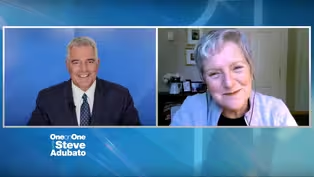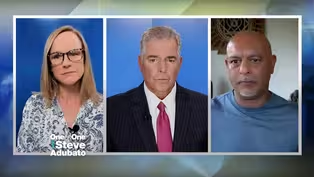One-on-One
Why Compassion and Empathy is Needed in Business
Clip: Season 2024 Episode 2670 | 9m 53sVideo has Closed Captions
Why Compassion and Empathy is Needed in Business
Steve Adubato and his Lessons in Leadership Co-Host Mary Gamba are joined by Tierney Wade, Chief Operating Officer at the National Society of Leadership and Success (NSLS), to discuss why we need compassion and empathy in business.
Problems playing video? | Closed Captioning Feedback
Problems playing video? | Closed Captioning Feedback
One-on-One is a local public television program presented by NJ PBS
One-on-One
Why Compassion and Empathy is Needed in Business
Clip: Season 2024 Episode 2670 | 9m 53sVideo has Closed Captions
Steve Adubato and his Lessons in Leadership Co-Host Mary Gamba are joined by Tierney Wade, Chief Operating Officer at the National Society of Leadership and Success (NSLS), to discuss why we need compassion and empathy in business.
Problems playing video? | Closed Captioning Feedback
How to Watch One-on-One
One-on-One is available to stream on pbs.org and the free PBS App, available on iPhone, Apple TV, Android TV, Android smartphones, Amazon Fire TV, Amazon Fire Tablet, Roku, Samsung Smart TV, and Vizio.
Providing Support for PBS.org
Learn Moreabout PBS online sponsorship(upbeat music) - Folks, I'm about to introduce you to a segment that my colleague Mary Gamba over on our sister series, Lessons and Leadership, we did with Tierney Wade, Chief Operating Officer of an organization called the National Society of Leadership and Success.
What was the topic?
What is the topic?
Empathy.
Who has it, who doesn't have it?
Its connection to leadership.
Its connection to life.
How those who may think they lack, the degree of empathy that they need, how they can gain it, whether you're born with it, whether you can teach it, coach it, learn it.
These are questions that I think about all the time in my other life as a leadership coach.
And Tierney Wade talks about empathy.
It's more important than ever before.
Let's listen to her.
Welcome to Lessons in Leadership, Steve Adubato, with my colleague Mary Gamba, how we doing Mary?
- It's another great day, Steve.
You know me, always setting those positive intentions for the day and let's make it a great day.
- Oh wow, that is so uplifting.
Let's welcome Tierney Wade, who's Chief Operating Officer, the National Society of Leadership and Success.
The website will be up.
Tierney, welcome to Lessons in Leadership.
- Thank you Steve and Mary for having me.
- You got it.
Your expertise in a whole range of areas about leadership is so fascinating.
But the one that really we wanna focus on today, empathy.
You understand empathy better than most.
So here's the question I've been struggling with for 20 plus years as a leadership coach, can you teach people to be empathetic or does it have to be in your DNA?
- That's a great question that, you know, I've read studies and seen studies that suggested that empathy is actually a primitive emotion that we are biologically programmed.
So we're born with it.
It's the nature that is instilled in us.
It's actually called like emotional contagion.
So it's contagious.
It's the ability for us to share another being's emotion.
And so that's why sometimes when you're in a room and you see a baby and it hears another baby crying, it too will start crying, right?
It's like a contagious emotion.
So it's a reflex of shared emotion.
So some researchers actually suggest that empathy is hardwired biologically inside of us so that we can take care of our young, right?
So increase our odds of our genes continuing.
So you are born with empathy, right?
It's the emotional contagion.
But what happens as you get into adulthood is that your capacity or your bandwidth to have empathy in the forefront of your life, it really shrinks, right?
Because you're thinking about taking care of yourself or your loved ones.
So that capacity that you have and that bandwidth that you have to exert empathy, it really shrinks.
And so I think it's really important that you are able to go back to having awareness that you have it inherently, and just making sure that it's something that you are aware of and bringing forth.
But it's definitely something we're born with.
Now, whether or not we have it into adulthood as an awareness piece, that's something we need to work on.
- Well, Tierney, here's the dilemma.
For those of us who coach, teach, write about leadership, obsess about leadership.
You're working with a client who is a vice president of whatever, CEO of whatever, manager, whatever.
And they're saying, the feedback I'm getting is that I'm not empathetic enough with my team members.
They don't sense that I care enough about them and their world.
And I'm sitting there trying to coach them to be more engaged, empathetic, and care more.
And you seem to be saying, what are you doing, Steve?
It is what it is.
- [Tierney] I think that if you're a leader, listen, results, goals, achievements, those are all really important.
We can all agree on that.
What we can also agree on is building relationships has to be a leader's top priority in order to exhibit empathy.
And so when I think about building relationships, and I think about the best ones that you have in your life, whether it's your personal relationship or your professional relationship, why do you stay in those relationships?
It's because you.
- Well, sometimes I need a job.
Sorry for interrupting.
Sometimes we need a job.
because you need a paycheck to pay the rent.
- Correct, yeah.
So you stay in it because there's a benefit you're receiving, right?
Either because you feel cared for, you're financially or intellectually benefiting, to your point.
And what you need to do as a leader is build that relationship so that the person feels valued and heard, and that they're receiving a benefit from it.
Now you say they can receive a financial benefit from it.
Correct, so in that relationship that you're building, you really need to listen, have them be heard, understand what it is that they find mutually beneficial from that relationship so they can be more motivated, more invested, more successful, and they will stay.
So I think if you're talking to a leader and really trying to get them to be more empathetic in the workplace, they need to spend the time to authentically want to build that relationship.
To get that individual to stay.
- Got it, easier said than done, but it's important.
Go ahead, Mary.
- Yeah, Tierney, what do you say to people because I have heard this before, that I've heard some of the leaders that Steve and I have coached, Steve and I have worked together for over two decades.
Say, Hey, if I show too much empathy, too much compassion, it's going to show that I'm a weaker leader.
It's gonna show that I'm too soft.
What do you say to those leaders?
Because I do believe there's a fine balance between, as a leader, you do need to make some tough decisions and it's gonna make you not popular.
But how do you balance being just mean and but also being empathetic and not being too wishy-washy.
- I think there's a separation between being mean or to, as you say, wishy-washy versus being transparent and being human in the way that you communicate.
So when I hear that individuals say, well, I don't want to be shown as weak, right?
I say, at the end of the day, you're building a relationship with your coworkers.
You're building a relationship with your employees and your staff, you showing yourself as being vulnerable in your thoughts.
And you're asking for opinions shows that you have no ego.
It doesn't show that you're weak.
It shows that you have no ego.
So when it goes to building that relationship with your coworkers and your employees, what I do personally is obviously I listen and I ask for their opinion, right?
And I show that I care about what they're saying.
I also try not to be rehearsed.
So what I do then is when I speak to them, I don't use corporate jargon or philosophical, philosophies from like a book or a strategy that I've read.
Instead, I share with them in plain speak as if we're just talking, right?
So that we can focus on what we're saying versus having them decipher what I'm trying to mean, and I think it's important as a leader, that you are able to be relatable and share your experiences, what you're thinking and what you're feeling as well.
It doesn't mean that you're weak, it's meaning that you're being transparent and not having an ego.
So I one, not to really believe and you know, showing and demonstrating by force or by that I know it all.
It's more about relating to actually being interested and invested in their thoughts, in their feelings.
At the end of the day, they're the ones who really make the work environment what it is and really grows our company.
- Tierney, last point on this.
There have been times where we have to make a decision to let some people go.
And empathy in some people's minds means, well, they have a family, they have a mortgage, they have rent to pay, they have kids, they have college, the bills, they have whatever.
And you have to make the right decision for the team.
And if that decision is to let that person go, you want to empathize with that person's experience and the fact that they're gonna suffer financially.
But you still have to do what's right for the team.
And if that person walks away thinking you're a horrible person and you hurt them, you have to live with it.
And that's why leadership ain't for everybody.
Because while we're being empathetic, we also have to be empathetic and compassionate and real to the bottom line of the organization and everybody else.
Complex stuff, Tierney Wade, Chief Operating Officer of the National Society of Leadership and Success.
I wanna thank you so much for joining us on Lessons in Leadership, thank you.
- Thank you for having me.
- You guys stay with us, we'll be right back.
- [Narrator] One-On-One with Steve Adubato has been a production of the Caucus Educational Corporation.
Celebrating 30 years in public broadcasting.
Funding has been provided by Wells Fargo.
Newark Board of Education.
PSEG Foundation.
New Jersey Sharing Network.
The Fidelco Group.
Holy Name.
New Jersey’s Clean Energy program.
PSE&G, And by The Adler Aphasia Center.
Promotional support provided by Meadowlands Chamber.
And by NJ.Com.
Diana Henriques Highlights Her Novel "Taming The Street"
Video has Closed Captions
Clip: S2024 Ep2670 | 7m 57s | Diana Henriques Highlights Her Novel "Taming The Street" (7m 57s)
Transcendent Leadership and Shifting Workplace Culture
Video has Closed Captions
Clip: S2024 Ep2670 | 10m 43s | Transcendent Leadership and Shifting Workplace Culture (10m 43s)
Providing Support for PBS.org
Learn Moreabout PBS online sponsorship
- News and Public Affairs

Top journalists deliver compelling original analysis of the hour's headlines.

- News and Public Affairs

FRONTLINE is investigative journalism that questions, explains and changes our world.












Support for PBS provided by:
One-on-One is a local public television program presented by NJ PBS

